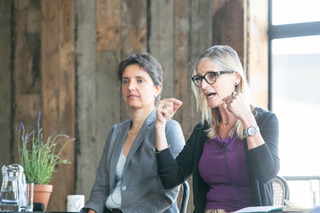Partnerships for Nature: insights from Indigenous-led models in Canada
15 April 2025 / WORDS BY Pollination Foundation
read article
London+44 203 355 1556
Sydney+61 2 8313 7109
Melbourne +61 2 8313 7109
Washington +1 872 201 1168
In this second edition of Nature Finance Focus, we highlight a number of models that are helping to unlock and scale nature investment. Some models are well established, alongside others in which we see significant promise and growth. By showcasing these tangible case studies, we aim to provide ideas and options which can be taken up by the global bank or investor, or by the major corporate.
The report also details the findings of our biennial survey of 500 institutional investors across the UK, USA, Australia, Singapore and Japan.
View reportFour years ago, when Climate Asset Management launched as a joint venture between HSBC and recently formed consultancy Pollination, it laid out ambitious plans to become the biggest investor dedicated to natural capital.
22 June 2022 / WORDS BY Pollination
Last week was significant for UK food and agriculture with the launch of the Government’s food strategy and the publication of the Sustainable Food Trust’s report on ‘Feeding Britain from the Ground Up‘. Together, these mark a critical step towards greater awareness and alignment on the imperative for the transformation of food systems more broadly.
Dr. Helen Crowley, Managing Director at Pollination, participated in the Sustainable Food Trust’s two day workshop and joined a panel to discuss financing approaches for UK food and agriculture at Fir Farm. The far reaching and insightful discussions were mostly ‘grounded’ in real life examples and served to highlight the most pressing issues.
Now, more than ever, ‘feeding the world’ is front and centre in a wide range of debates, both in the public and private sectors. What makes things different at this juncture is that not only are we are facing severe and inequitable food shortages as one of the many devastating consequences of the Ukraine crisis, but also the fact that there is a growing recognition that how we produce our food (in the UK but also globally) is absolutely fundamental to so many critical issues. These include addressing our health and nutritional challenges; mitigating and adapting to climate change; halting our loss of biodiversity; and getting on a pathway to restoring the natural capital upon which our society and economy depends. There is simply no time to waste in building long-term resilience and security into the food system in order to deliver affordable food for all, whilst simultaneously providing robust livelihoods for the farmers themselves. It was particularly inspiring to see that in evidence at the event, and to hear examples of farmers around the world who have demonstrated a way forward.


There is, of course, much to do to facilitate the shift from agricultural production that uses chemical and fossil-fuel based inputs for food (and fibre production) to a system based on regeneration, restoration and resilience. Some of the key issues which need to be addressed include breaking down the silos between health, agriculture and environment in public policy to align appropriate funding for nutritious and secure food production; recognition of the critical role that farmers play as custodians of natural capital so enhancing technical support alongside financial support for them; and building new approaches for collaborative supply chains that recognize the embedded value in regeneratively produced food.
Dr. Crowley, along with Sir Alan Parker, Chairman of Brunswick Group; Ian Burrow, Head of Agriculture and Renewable Energy at NatWest; Alasdair MacLeod, Executive Chairman of the Macdoch Group and Christine Delivanis from Systemiq had a lively discussion about the importance of public finance; the role of private finance and supply chains in addressing both the hidden costs but also supporting the embedded value in regeneratively produced food; and how new and emerging markets for carbon and biodiversity can de-risk the transition for farmers as they move to more restorative production systems.
What is now clearer than ever is that there are enormous opportunities for nutrition, food security, climate and biodiversity as we turn agriculture into a powerful global ‘nature-based solution’.
15 April 2025 / WORDS BY Pollination Foundation
read article
Receive latest news and global perspectives from Pollination.
By clicking submit, you agree to our Terms & Conditions.